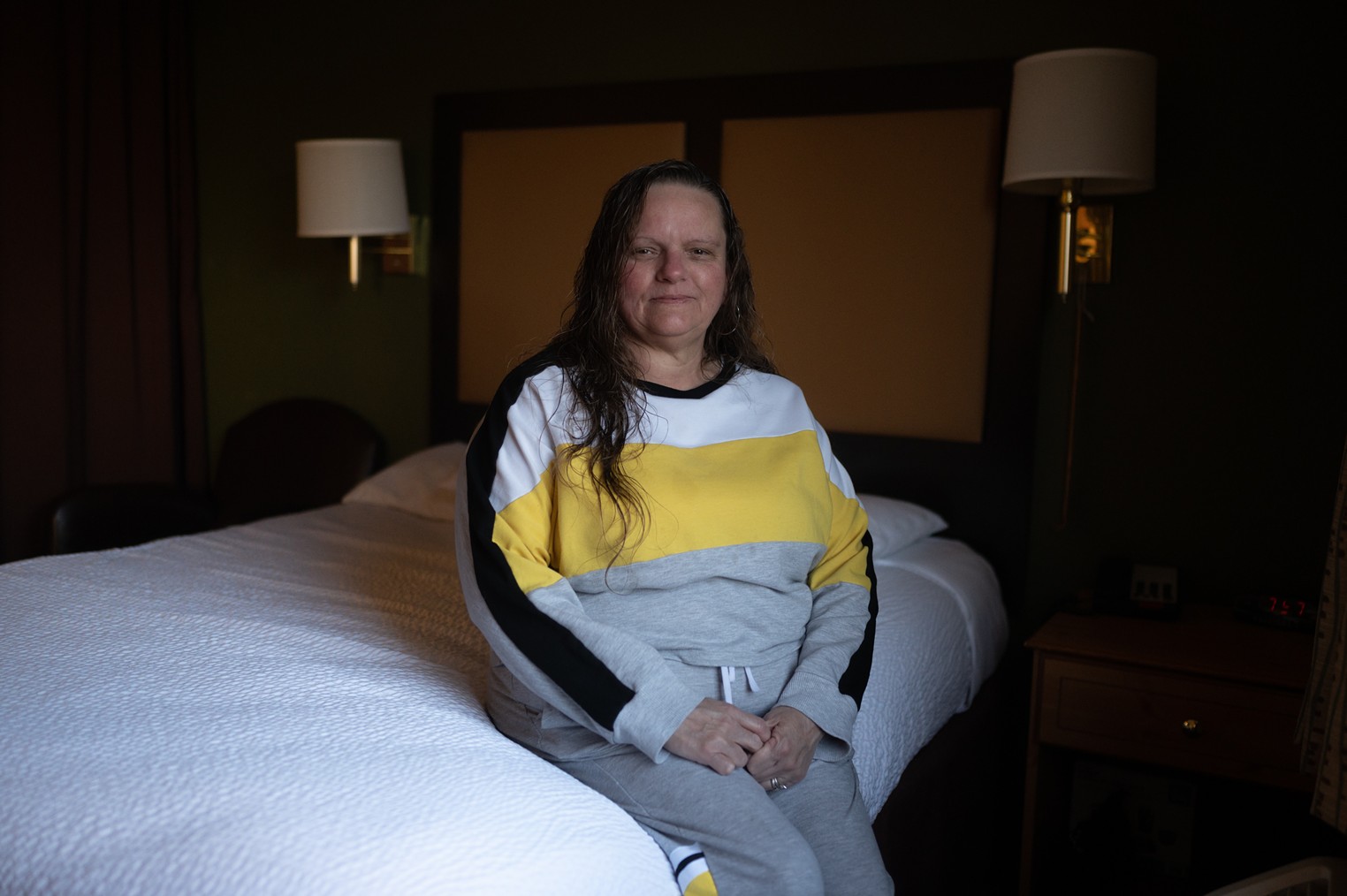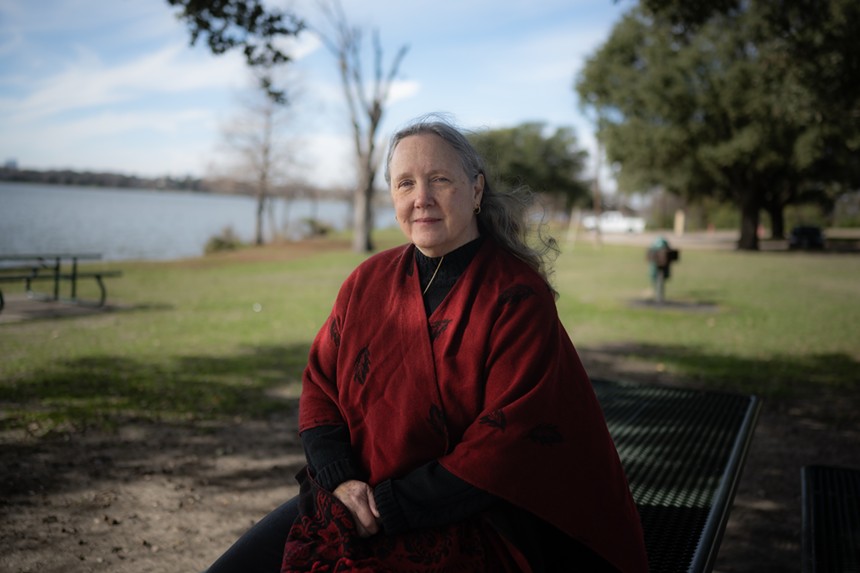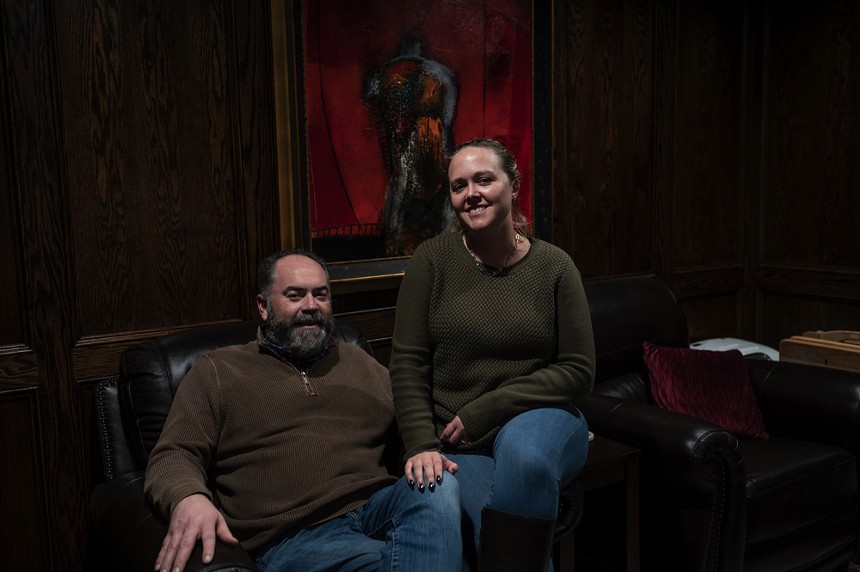As Evictions Rise to Pre-COVID Levels, the Story of One Family’s Life on the Edge of Homelessness

Angela Smith says her husband will not be happy about this story. She launched a GoFundMe, too, and he wasn’t too keen on that.
“We both have a hard time asking for help,” she says. “He doesn’t want our burdens to become anyone else’s.”
But the 55-year-old says she felt her story needed to be told, as many others are going through the same struggles. Her husband, who is 22 years her junior, will understand.
In September, Smith, her husband and their “fur baby” Juana (a chiweenie, which is a cross between a Chihuahua and a dachshund) were evicted from an Irving apartment complex called Brittney Place. The eviction was the end of a battle with red tape that consumed over a year and a half of their lives, and it was also the beginning of a new kind of struggle.
For the last three months, Smith, her husband and their dog have experienced intermittent homelessness. They’ve lived out of their car for weeks at a time; they’ve crashed with Smith’s sister-in-law and her children in a Grand Prairie apartment; and as of this writing, the trio are living week-to-week in a motel. Money from the GoFundMe, which Smith started after their eviction, was largely spent on car repairs, so now they subsist on money from her husband’s new job at a transport and logistics company. But for a while, both were unemployed. Smith hasn’t worked in recent years because of back and neck injuries caused by a 2010 car accident, and her husband was laid off during the pandemic. In November, Smith finally began receiving disability payments two years after applying for them.
In many ways, Smith and her family are not alone. According to data from the Child Poverty Action Lab, landlords filed 40,165 eviction cases in Dallas Country through Dec. 4 of this year — just 600 fewer than the last two years combined. Granted, 2020 and 2021 statistics are skewed by eviction moratoriums ordered by the Centers for Disease Control and Prevention that were in place during the height of the COVID-19 pandemic. (The Supreme Court effectively ended the moratorium in August 2021.) But the 2022 figure represents a year-to-date increase from 2019. That year, there were fewer than 40,000 eviction filings in Dallas County through Dec. 4.
“Pre-COVID, there was a pretty predictable pattern for evictions,” says Ashley Flores, senior director at the Child Poverty Action Lab. “There was almost a seasonality to it: There’d be spikes in January and late summer or early fall.”
It’s too early to tell if this trend will resume in a post-pandemic world, she says, but it’s not too early to be concerned.
“Prices are making it more and more difficult to stay current on rent, and because we have such a hot market with low vacancy rates, renters don’t have a lot of leverage.”
Smith’s story illustrates just how powerless renters can be in the face of the Texas landlords who are benefitting from that piping-hot market.
“The worst part,” Smith says, “is that all of this could’ve been avoided. We wouldn’t be living like this if our apartment had agreed to accept our rental assistance. The nightmare would’ve never happened.”
***
Smith met her husband 14 years ago at a drive-in theater in Midland. In 2008, both Smith and her eventual husband were working The Big Sky Theatre, a three-screen venue where the vast Texas skyscape and its glittery stars often distract from the films. She was 41; he was 19.
Smith was a cook for the theater’s concessions operation, and her then-boyfriend cleaned up the parking lot after the films. Since it was a small operation, she used to lend her partner a hand and pick up discarded popcorn and candy. Then came the 2010 car accident that will likely plague Smith the rest of her life.
She was with two friends when a truck rear-ended their car. Her memory of the crash itself is hazy, but she does recall “feeling stuck” at one point. The hospital let her go the same day, but they recommended surgery for the crack in her neck. Since Smith didn’t have insurance, the operation would’ve cost her $135,000.
“There was just no way that was ever going to happen,” she says.
Her boyfriend helped nurse her back to health as well as he could, but Smith has never been the same since. She has trouble walking, and more recently, the injury has kept her from being able to work at a full-time job.
“When it was my turn to talk, I forgot to tell the judge what he needed to hear. I had never done this before, and it was all a little overwhelming.” – Angela Smith
tweet this
Shortly after the accident, what began as a quibble over the cooking of drive-in chili led to a full-blown argument with her boss. Smith was fired from the theater and eventually got a job at a local Family Dollar. She and her husband stuck around West Texas until 2020, when they moved to Dallas.
After initially settling in at a different apartment building, Smith, her husband and the dog made their way to Brittney Place in Irving. The complex changed ownership shortly after the Smiths moved in. (Representatives of Brittney Place did not return a request for comment.)
Multiple people interviewed for this piece say Texas is one of the most “landlord-friendly” states in the country. They may have a point: Texas has no rent control laws nor limits on security deposits. Further, barring any local ordinances, Texas landlords are not required by law to give their tenants a chance to make up for missed rent; they can simply issue a notice to vacate within three days.
The Smiths fell behind on rent multiple times during their stay at Brittney Place, and at one point, they received much-needed rental assistance from a nearby chapter of Catholic Charities. According to Smith, there were multiple problems with the amounts they were being charged. At one point, she says the apartment complex was operating under the erroneous assumption that she and her husband were month-to-month tenants, thereby charging them more per month. When the couple fell behind on rent a second time in summer 2022, Smith was hoping ownership would work with her: Her husband had lost his job, and she had yet to receive the disability payments for which she applied in 2020. This is where the duo from Midland met a perfect storm of red tape.
The city of Irving, which was ready to supply some rental assistance, needed a new lease from Brittney Place to disburse the funds. Meanwhile, Brittney Place needed the funds to issue a new lease, yet their policy dictates they cannot issue a new lease to tenants who have a balance on their account. (“A lot of times, the apartment’s policy is just some bullshit they made up,” notes Mark Melton, a Dallas attorney who has made a name for himself as a staunch tenants’ advocate.) Of course, the Smiths needed the assistance from the city to get rid of the balance on their account. Unable to reconcile the landlord’s policy and the city’s rules, the Smiths received an eviction notice.
“We were always told an eviction is like a black mark,” Smith says. “How do you wash away a black mark?”
Specifically, evictions stay on credit reports for at least seven years and severely limit tenants’ future renting options. In a “hot” real estate market like today’s, where landlords have most if not all of the power, an eviction is indeed akin to a black mark.
Smith was told all of this by her legal aid rep, who urged her to appeal to the judge with a detailed story of her family’s struggles. The rep also told her to tell the judge that the eviction notice was not properly given. (Smith claims the notice appeared on the outside of her door, when the law dictates the notice must be hand-delivered, delivered by mail or posted on the inside of the door.)
But Smith froze up.
“When it was my turn to talk, I forgot to tell the judge what he needed to hear,” she says. “I had never done this before, and it was all a little overwhelming.”
Ever since, Smith and her husband have bounced between temporary housing and homelessness.
***
Sandy Rollins spends every day talking to people who have been priced out of the rental market. As the executive director of Texas Tenants’ Union, she helps individuals understand their rights and connects them with the resources they need. She also has an in-depth knowledge of policy shaped by decades of advocacy experience. Nothing surprises her anymore, but that doesn’t mean she is any less incensed by the abhorrent behavior and “lack of empathy” she sees throughout her state.
“For landlords to blame inflation for rising rents is disingenuous,” she says. “To raise rent 30% when inflation is at 7 or 8 percent? It doesn’t add up. They’re only doing it because they can.”
Just as frustrating for Rollins is the seemingly arbitrary red tape that often encumbers renters like Smith — or renters who can’t find a place to live to begin with.
“I’ve seen landlords use all kinds of terms and conditions to make it prohibitive to rent or to terminate early,” she says.

Sandy Rollins helps tenants understand their rights in Texas as inflation and rising rents threaten their housing.
Mike Brooks
One such policy is the often-used rule that tenants must earn three times the monthly rent of their specific apartment.
“Often it coincides with new ownership, but it doesn’t have to,” Rollins says. “Sometimes landlords do a rescreening, and if you don’t make three times the rent, they’ll issue a notice of nonrenewal.”
The “three times” policy becomes even more strenuous when you realize just how much rents have recently risen in Dallas. For instance, a recent study shows rent costs in the city of Dallas have risen 25% since the start of the pandemic. In the suburbs, that number is closer to 30%. Meanwhile, Dallas’ occupancy rate is hovering around 93%.
In short, the problem is three-fold: Prices are up; stock is low; and people who fall behind on rent are at the mercy of a landlord, a judge and a market hostile to renters. In some cases, advocates find themselves walking a tightrope with bad housing options on one side and homelessness on the other.
“We don’t see fewer cases of landlords refusing to fix mold; we see more of those,” says Melton, the attorney. “This is a conversation we have all the time. You’d love to go in and enforce every code, but if you do, you’re going to have a lot of buildings lose their COs (certificate of occupancies). I literally had a conversation with someone at the city the other day where I said, ‘Do not pull that CO. If you do, those people will have nowhere to go. That’s how bad the market is right now, and as bad as some situations are, it’s better than the street.”
Melton, who founded the Dallas Eviction Advocacy Center, somehow found time to bill over 300 hours of tax law work in November while working with the city to revise Dallas’ minimum housing standards.
“I’ve got my hands in a lot of things,” he admits.
On the way to an early December wedding in New Orleans, he also found time to talk about potential solutions to the city’s dual crises of rising rents and low stock of affordable housing.
“The $800 to $1,000 per month apartments aren’t ideal, but for a lot of people, that’s all they can afford,” he says. “In fact, it’s more than they can afford. You can fix that with large-scale acquisitions instead of leaving it up to free market forces.”
Like Rollins, he also laments the lack of empathy he sees for tenants who fall behind on rent or struggle with homelessness. That contempt shows up in the conversation about vouchers: the subsidy program by which families can receive assistance paying their rent and utilities.
Even though a lot of people have maintained their job and their income at the same level since 2020 or 2021, Melton notes, inflation has made everything more expensive. This means more people qualify for government housing vouchers. At the same time, they carry a stark stigma.
“To raise rent 30 percent when inflation is at 7 or 8 percent? It doesn’t add up.” – Sandy Rollins, Texas Tenants Union
tweet this
“Vouchers aren’t a freebie,” Melton says. “It’s not like you’re out there living some fabulous life. All it’s doing is adjusting rates so they’re affordable.”
Rollins said she doesn’t hear much talk about inflation or things getting more expensive. Instead, she hears about the “terrifying” bottom-line issues: Where am I going to live next week? If I get evicted, how will I ever find another place to live?
Many rental assistance programs, including those sprinkled throughout Dallas, have run dry. That, too, is another thing Rollins often hears about: Where can I get help?
“There’s a very long waiting list for the affordable housing programs that are out there,” she says. “There’s also a huge need for apartments that cost $500 or $600 or less, and there’s just not enough of those without a subsidy.”
When asked about possible solutions, Rollins, Melton and Flores, the researcher from Child Poverty Action Lab, each shared some cause for hope.
Multiple bills currently in the Texas Legislature may create rare relief for people who have been evicted. One such bill, introduced by Houston Rep. Gene Wu, would make an eviction filing confidential if the judge finds in favor of the defendant or the case is dismissed without relief for the tenant. As it stands today, the mere filing of an eviction can plague a tenant’s record simply by existing; a landlord may see it and immediately assume the worst.

Lawyer Mark Melton and his wife, Lauren Melton, founded the nonprofit Dallas Eviction Advocacy Center to provide legal representation to tenants facing eviction in the city.
Mike Brooks
On the housing front, increasing production of affordable housing is a must, particularly since Dallas’ history of high rents, redlining and NIMBYism have fueled its ongoing affordable housing crisis. In the short term, tenant education and legal representation are critical. (Melton stresses that judges are much more receptive to tenants’ plight when there’s a lawyer by their side.) Plus, perhaps most important of all, this trio of experts believe it is time for permanent solutions that move beyond the vital yet fleeting remedies offered during the pandemic.
“We’re at an important moment in time in Dallas where all of our COVID-era resources and interventions have been exhausted,” Flores says. “We have an opportunity to think about what eviction prevention should really look like.”
And the stakes are arguably as high as they’ve ever been.
“Now that the rent assistance programs are effectively out of money, I think we’re about to see some massive increase in homelessness,” Melton says. “Because, number one, all the rents are going up. So if someone gets evicted, and they can even find a place, their rent probably goes from $800 to $1,200, and there’s no help anymore. It’s gone.”
Right now, that’s what the Smith family is trying to do: find their next place. But that’s a tall order.
All their money is going to motel fees, and as of this writing, the family wasn’t sure how much longer they could afford those costs.
“We’re at an important moment in time in Dallas where all of our COVID-era resources and interventions have been exhausted.” – Ashley Flores, Child Poverty Action Lab
tweet this
Shortly after their eviction in September, the family lived for weeks in their car. Smith’s husband was working at the time, which made for a logistical nightmare. Each morning, the family would rise, drive from the lot where they parked overnight, then drive to Smith’s husband’s job. Then, after work, they’d find a new place to park. The car broke down at one point, so they had to use the hundreds in GoFundMe cash to fix their sole source of both transportation and shelter.
They eventually started crashing with Smith’s husband’s sister, but right around Thanksgiving, they moved to a motel.
“His sister has kids,” Smith says, “and we’re not trying to put anyone out.”
For now, they’re taking things week by week. Every cent of her husband’s paycheck is going to the motel, but soon, Smith says, they may have enough savings to put down a deposit on a new place. Christmas will be spent in the motel, but if she had her way, Smith would like to see family. That would involve telling them about the eviction, though, which she has yet to do. She doesn’t want them to worry.
“It’s been stressful, but it’s worked out for the most part,” Smith says after a particularly taxing week. The family owed the hotel some money, and after a couple days of worrying and waiting for a check, they were able to make the payment.
“It took my husband’s whole check to keep us here. We don’t have funds for gas or personal items, but we have a roof over our head. It’s going to be stressful for a while due to the fact that we have to pay every week,” she adds, “and we don’t know if my husband’s check will cover it each week. But as of now, we have a roof over our heads.”
[ad_2]
Share this news on your Fb,Twitter and Whatsapp
Times News Network:Latest News Headlines
Times News Network||Health||New York||USA News||Technology||World News